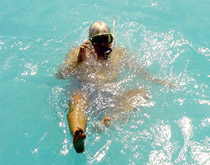
On the fantail of the RV Calanus, a laboratory ship floating off the Bahamian coast in 1980, Frank Millero relaxes with a beer. The physical chemist has spent the day scuba diving for sediment samples in his study of ocean whiting, a mysterious undersea fog that turns blue seawaters white. From nearby Andros Island, a speedboat suddenly closes in. Millero views what looks like a submachine gun honed in on him.
Pirates!
"Fortunately," recounts Millero, a lifelong Democrat, "the captain was a Reaganite and had all kinds of guns." Brandishing enough firepower to make the intruders hesitate, the Calanus scoots back to Miami without firing a shot. "In the paper, we published a skull 'n' bones," laughs Millero (S'64, '65), "noting we couldn't continue the voyage because of pirates."
The high-seas drama didn't derail the Carnegie Mellon alumnus' career. The University of Miami professor has many career accomplishments, including authoring five books, 32 published chapters, and more than 400 papers and 12,000 citations. He has determined a seawater equation that colleagues consider the "gold standard," enabling density calculations that are essential for climate modeling and acoustic research. He also pioneered the study of carbon dioxide uptake in ocean waters, identifying and defining the problem of ocean acidification.
His contributions have earned him the Geochemical Society's V.M. Goldschmidt Award, its highest honor, which he will receive this summer during a ceremony in Prague. At 72, he continues his research but adds that he leaves the scuba diving to his students.
—William Abernathy



